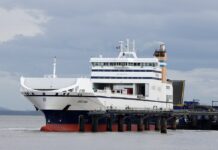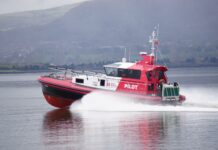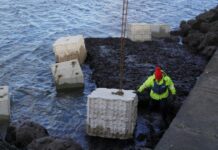Ireland’s latest marine research vessel has been named the RV Tom Crean after the legendary Irish Explorer from Kerry, who undertook three ground-breaking expeditions to the Antarctic in the early years of the 20th Century.
The RV Tom Crean was recently commissioned at a special event in Dingle Harbour by Minister Charlie McConalogue TD, Minister for Agriculture, Food and the Marine.
“I don’t need to remind anyone that Ireland’s oceans are vital to our economy, our environment, and many aspects of our daily lives. The RV Tom Crean will undertake essential scientific work, which will support many of the projects outlined in the Programme for Government; including fisheries assessments (so crucial to our coastal communities), food security, offshore renewable energy, marine spatial planning, marine protected areas and assist the State in addressing the challenges of climate change.”
 The RV Tom Crean will be based in Galway and will enable the Marine Institute to continue to carry out vital surveys that contribute to Ireland’s position as a leader in marine science. The research vessel will carry out a wide range of marine research activities including expanded fisheries surveys, seabed mapping, collect data to support marine spatial planning, climate change related research, environmental monitoring, deep water surveys, and undertake research in the Atlantic Ocean with Ireland’s EU partners.
The RV Tom Crean will be based in Galway and will enable the Marine Institute to continue to carry out vital surveys that contribute to Ireland’s position as a leader in marine science. The research vessel will carry out a wide range of marine research activities including expanded fisheries surveys, seabed mapping, collect data to support marine spatial planning, climate change related research, environmental monitoring, deep water surveys, and undertake research in the Atlantic Ocean with Ireland’s EU partners.
The new research vessel is a silent vessel, capable of operating throughout the Irish Exclusive Economic Zone (EEZ) and will replace the RV Celtic Voyager, which was Ireland’s first purpose-built research vessel which arrived in 1997. The vessel makes much less underwater noise than traditional vessels, reducing the effect of noise on fish populations while surveying and sampling, so that a more accurate stock assessment can be made.
The RV Tom Crean will be at sea for 300 operational days each year – heading to sea for at least 21 days at a time – and aims to accommodate up to 3000 scientist days annually and is designed to operate in the harsh se conditions of the Atlantic.
The vessel design incorporates the latest proven technologies to ensure that it operates as efficiently as possible, with reduced fuel consumption and minimising the vessel’s environmental impact and carbon footprint.
You can track the progress of the vessel and the research it is undertaking on the Marine Institute website here.












